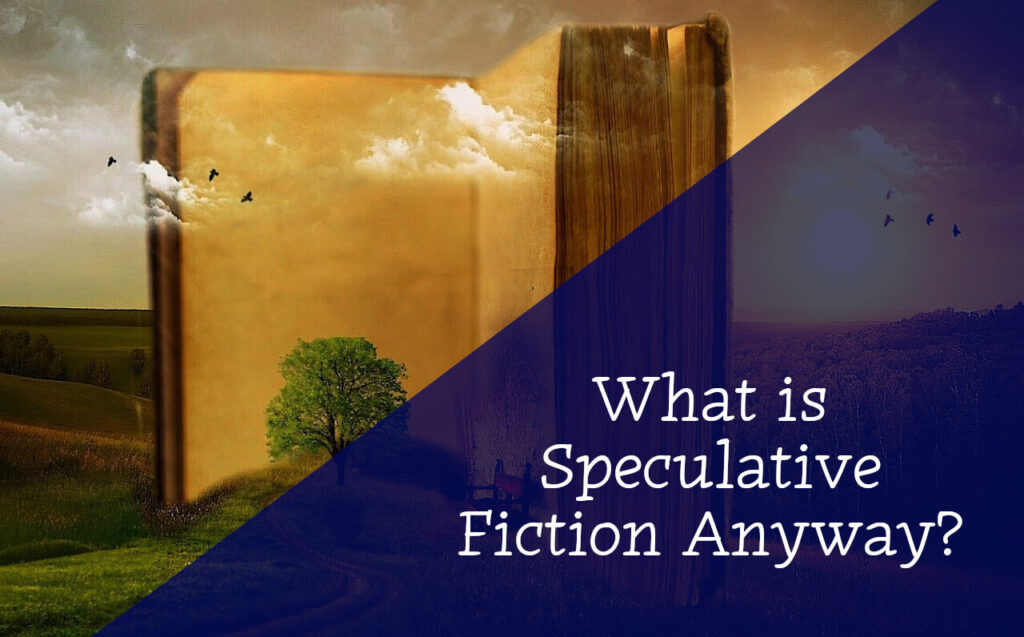We’ve spent the past few posts discussing point of view, scenes, and characters. I think it prudent to pause a moment and back up a bit. Before you can create your characters, decide on point of view, or start crafting scenes, you need to know what type of story you’re working on. Obviously, there are many fiction genres, but my area of expertise is speculative fiction, so that’s what I’ll be focusing on here. So, what is speculative fiction?

The beauty of a good book is getting to be transported to a different world. Sometimes that means our world through someone else’s eyes. But other times it literally means to a different world or a different version of our world. These latter two options tend to fall into the category of speculative fiction.
Defining Speculative Fiction
Speculative fiction is a very broad term, which is why some people find it so confusing. This genre is all about stories with imagined elements. Is your novel futuristic? It’s speculative fiction. Does your story involve the supernatural? It’s speculative fiction. Does your story alter the reality of our world? Is it set on a different world? Are there magical abilities or creatures? Guess what? It’s speculative fiction.
Speculative fiction is a genre that diverges from the accepted rules of our world. It is a catchall phrase to cover fiction dealing with elements that do not exist in the real world. Elements like magic, other realms of existence, monsters, speed of light travel, advanced technologies, or any number of things that we can’t possibly experience in our current daily lives. This means it is a genre with many sub-genres including fantasy, science fiction, horror, alternate history, dystopian fiction, and magical realism to name a few.
Let’s Talk Genres
Fantasy, science fiction, and horror all have many of their own sub-genres which we will be taking a closer look at in the next few posts. For now, let’s focus on some broad definitions of genres that fall under the speculative fiction umbrella. I’ll also provide some examples of books written in these genres to help you get your bearings. (And to plump up your To Read piles).
Fantasy
The fantasy genre typically contains elements of magic and the supernatural. This genre tends to emphasize magic and the unexplainable over technology and science. Fantasy stories can be set in our world with magical or supernatural rules applied to them, or they can be set in a fictional world as different from our own as the author likes.
Examples of fantasy books include The Rage of Dragons by Evan Winter, Children of Blood and Bone by Tomi Adeyemi, and Legends & Lattes by Travis Baldree.
Science Fiction
The science fiction genre typically deals with the advancements of science and technology in a more futuristic setting (though the futuristic setting is not a pre-requisite). These stories can be set on Earth, in space, or on other planets. The emphasis for science fiction genres tends to be on things like scientific and technological advancements, interspecies relationships, and exploration of new worlds.
Examples of science fiction books include Binti by Nnedi Okorafor, The Deep Sky by Yume Kitasei, and The Stars are Legion by Kameron Hurley.
Horror
The horror genre is meant to frighten, scare, or make the reader feel ill at ease. Stories in this genre typically explore themes related to demons, spirits, death, and the afterlife. The horror genre explores the shadowy places in our minds while tackling some big topics.
Examples of horror books include The Only Good Indians by Stephen Graham Jones, And Then She Fell by Alicia Elliot, and The Spirit Bares Its Teeth by Andrew Joseph White.
Alternate History
As the name implies, the alternate history genre takes real historical events and explores what the world may be like if that event had a different outcome. Alternate history doesn’t necessarily have any magical or futuristic elements, it simply speculates about what could have been.
Examples of alternate history books include Everfair by Nisi Shawl, Jonathan Strange and Mr. Norrell by Susanna Clarke, and The Difference Engine by William Gibson and Bruce Sterling.
Dystopian Fiction
The dystopian fiction genre is set in an oppressive society that attempts to project its perfection through control (be it moral, technological, corporate, totalitarian, etc.). These societies are typically in decline and the story conveys characters inciting change in their circumstance.
Examples of dystopian fiction books include Trail of Lightening by Rebecca Roanhorse, Parable of the Sower by Octavia E Butler, and Unwind by Neal Shusterman.
Magical Realism
The magical realism genre is set in the real world but has undercurrents of magic. The magic in these stories isn’t the main focus; it’s considered normal in the world and therefore is often unexplained.
Examples of magical realism books include The Particular Sadness of Lemon Cake by Aimee Bender, The Water Dancer by Ta-Nehisi Coates, and The Tiger’s Wife by Tea Obreht.
Why is Genre so Important?
Understanding the different speculative fiction genres will help you categorize your novel. And there are so many reasons being able to categorize your own writing will be beneficial to your process.
Knowing which genre you’re writing helps when it comes to worldbuilding and plotting. It means you can figure out which genre conventions you should adhere to, or at least consider, as you write. Genre conventions are what define the genres and set reader expectations. They are the story elements (such as character archetypes and settings) that commonly appear in books of certain genres.
This means that identifying your genre also helps your readers to choose your book. Readers choose books based on their expectations (which are often dictated by genre conventions). If they pick up a fantasy novel, they’re going to expect some form of magic or supernatural creatures. But if that book turns out to be about terra forming a new world, they’re going to be disappointed and probably confused.
Still have questions about what speculative fiction is? Or about the importance of genre conventions? Leave them in the comments.

5 thoughts on “A Broad Look at Speculative Fiction”